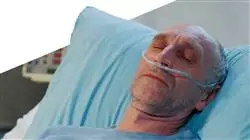University certificate
The world's largest faculty of medicine”
Introduction to the Program
Through this 100% online Postgraduate diploma, you will develop holistic treatment plans that will improve the quality of life of your end-stage patients”

Technology has completely transformed medical practice in recent decades. In the field of Palliative Care, these technological advances play an increasingly important role in controlling symptoms and relieving patients' suffering. For example, radiation therapy targeted to specific areas of pain helps to reduce inflammation and nerve compression, resulting in improved quality of life for individuals. However, to enjoy the benefits of these tools, physicians must regularly update their skills to manage them properly and thus optimize people's well-being.
In this context, TECH launches a revolutionary program in Symptom Management in Palliative Care. Designed by references in this field, the academic itinerary will analyze the scientific basis of pain experienced by terminally ill patients, addressing aspects such as epidemiology, anatomy or topographic atlas.
Likewise, the syllabus will delve into the most effective non-pharmacological treatments (such as Physical Therapies or Rehabilitation) and the most appropriate drugs in frequent comorbidities (among which Liver Failure stands out).
In line with this, the program will provide graduates with the keys to act in the emergencies related to conditions ranging from Febrile Neutropenia or Tumor Lysis Syndrome to Digestive Hemorrhages. In this way, specialists will apply the most appropriate therapies to control the discomfort of individuals and improve their clinical condition.
In addition to the rigorous academic material of this Postgraduate diploma, the program is taught in a 100% online methodology. This will allow specialists to update their knowledge from the comfort of their home, without the need to travel to academic centers. In addition, the disruptive Relearning method, of which TECH is a pioneer, allows the consolidation of complex concepts in a progressive and natural way. In addition, they will have a comprehensive Masterclasses taught by a true scientific-research reference in the field of Palliative Care.
TECH's International Guest Director is a true eminence in the Medical Sciences and will offer you exclusive Masterclasses that bring together the most cutting-edge innovations in Palliative Care”
This Postgraduate diploma in Symptom Management in Palliative Care contains the most complete and up-to-date scientific program on the market. The most important features include:
- Practical cases presented by experts in Palliative Care
- The graphic, schematic and practical contents with which it is conceived gather scientific and practical information on those disciplines that are essential for professional practice
- Practical exercises where the self-assessment process can be carried out to improve learning
- Its special emphasis on innovative methodologies
- Theoretical lessons, questions to the expert, debate forums on controversial topics, and individual reflection assignments
- Content that is accessible from any fixed or portable device with an Internet connection
You will deepen in the most sophisticated techniques to identify the cause of pain in patients with advanced pathologies”
The program’s teaching staff includes professionals from the sector who contribute their work experience to this specializing program, as well as renowned specialists from leading societies and prestigious universities.
The multimedia content, developed with the latest educational technology, will provide the professional with situated and contextual learning, i.e., a simulated environment that will provide immersive education programmed to learn in real situations.
This program is designed around Problem-Based Learning, whereby the professional must try to solve the different professional practice situations that arise during the course. For this purpose, students will be assisted by an innovative interactive video system created by renowned and experienced experts.
Do you want to delve into the most innovative treatments for Crisis Anxiety? Get it through this program in only 540 hours"

You will have access to a learning system based on repetition, with natural and progressive teaching throughout the entire syllabus"
Why study at TECH?
TECH is the world’s largest online university. With an impressive catalog of more than 14,000 university programs available in 11 languages, it is positioned as a leader in employability, with a 99% job placement rate. In addition, it relies on an enormous faculty of more than 6,000 professors of the highest international renown.

Study at the world's largest online university and guarantee your professional success. The future starts at TECH”
The world’s best online university according to FORBES
The prestigious Forbes magazine, specialized in business and finance, has highlighted TECH as “the world's best online university” This is what they have recently stated in an article in their digital edition in which they echo the success story of this institution, “thanks to the academic offer it provides, the selection of its teaching staff, and an innovative learning method aimed at educating the professionals of the future”
A revolutionary study method, a cutting-edge faculty and a practical focus: the key to TECH's success.
The most complete study plans on the university scene
TECH offers the most complete study plans on the university scene, with syllabuses that cover fundamental concepts and, at the same time, the main scientific advances in their specific scientific areas. In addition, these programs are continuously being updated to guarantee students the academic vanguard and the most in-demand professional skills. In this way, the university's qualifications provide its graduates with a significant advantage to propel their careers to success.
TECH offers the most comprehensive and intensive study plans on the current university scene.
A world-class teaching staff
TECH's teaching staff is made up of more than 6,000 professors with the highest international recognition. Professors, researchers and top executives of multinational companies, including Isaiah Covington, performance coach of the Boston Celtics; Magda Romanska, principal investigator at Harvard MetaLAB; Ignacio Wistumba, chairman of the department of translational molecular pathology at MD Anderson Cancer Center; and D.W. Pine, creative director of TIME magazine, among others.
Internationally renowned experts, specialized in different branches of Health, Technology, Communication and Business, form part of the TECH faculty.
A unique learning method
TECH is the first university to use Relearning in all its programs. It is the best online learning methodology, accredited with international teaching quality certifications, provided by prestigious educational agencies. In addition, this disruptive educational model is complemented with the “Case Method”, thereby setting up a unique online teaching strategy. Innovative teaching resources are also implemented, including detailed videos, infographics and interactive summaries.
TECH combines Relearning and the Case Method in all its university programs to guarantee excellent theoretical and practical learning, studying whenever and wherever you want.
The world's largest online university
TECH is the world’s largest online university. We are the largest educational institution, with the best and widest online educational catalog, one hundred percent online and covering the vast majority of areas of knowledge. We offer a large selection of our own degrees and accredited online undergraduate and postgraduate degrees. In total, more than 14,000 university degrees, in eleven different languages, make us the largest educational largest in the world.
TECH has the world's most extensive catalog of academic and official programs, available in more than 11 languages.
Google Premier Partner
The American technology giant has awarded TECH the Google Google Premier Partner badge. This award, which is only available to 3% of the world's companies, highlights the efficient, flexible and tailored experience that this university provides to students. The recognition as a Google Premier Partner not only accredits the maximum rigor, performance and investment in TECH's digital infrastructures, but also places this university as one of the world's leading technology companies.
Google has positioned TECH in the top 3% of the world's most important technology companies by awarding it its Google Premier Partner badge.
The official online university of the NBA
TECH is the official online university of the NBA. Thanks to our agreement with the biggest league in basketball, we offer our students exclusive university programs, as well as a wide variety of educational resources focused on the business of the league and other areas of the sports industry. Each program is made up of a uniquely designed syllabus and features exceptional guest hosts: professionals with a distinguished sports background who will offer their expertise on the most relevant topics.
TECH has been selected by the NBA, the world's top basketball league, as its official online university.
The top-rated university by its students
Students have positioned TECH as the world's top-rated university on the main review websites, with a highest rating of 4.9 out of 5, obtained from more than 1,000 reviews. These results consolidate TECH as the benchmark university institution at an international level, reflecting the excellence and positive impact of its educational model.” reflecting the excellence and positive impact of its educational model.”
TECH is the world’s top-rated university by its students.
Leaders in employability
TECH has managed to become the leading university in employability. 99% of its students obtain jobs in the academic field they have studied, within one year of completing any of the university's programs. A similar number achieve immediate career enhancement. All this thanks to a study methodology that bases its effectiveness on the acquisition of practical skills, which are absolutely necessary for professional development.
99% of TECH graduates find a job within a year of completing their studies.
Postgraduate Diploma in Symptom Management in Palliative Care
This Postgraduate Diploma in Symptom Management in Palliative Care created by TECH Global University is a program designed for health professionals who wish to acquire specialized skills in the effective management of symptoms in patients with advanced diseases. This course is offered in online mode, which gives you the flexibility to study from anywhere and adapt your study schedule to your professional and personal commitments. During this program, you will explore in depth the main symptoms experienced by palliative care patients, such as pain, fatigue, nausea, lack of appetite and other problems that affect their quality of life. You will learn the most up-to-date, evidence-based strategies to effectively assess, treat and manage these symptoms, thereby improving patients' well-being and comfort. In addition, you will be supported by a team of professional experts in the field of palliative care, who will guide you throughout the program and respond to your questions and queries in a timely manner. This direct interaction will allow you to get personalized feedback and make the most of your learning process.
Delve into symptom control in palliative care
The online modality of our Postgraduate Diploma offers you access to state-of-the-art, interactive learning resources. You will have access to online classes, teaching materials, discussion forums and practical sessions, all designed to enrich your learning experience and facilitate the understanding of complex concepts. Upon completion of this program, you will be prepared to meet the specific challenges of symptom management in palliative care, contributing significantly to patients' well-being and quality of life. You will obtain a recognized certificate that supports your knowledge and skills, strengthening your professional profile in the healthcare field. Take advantage of this opportunity to specialize and grow professionally in the area of symptom management in palliative care - enroll now and take a step forward in your career!







